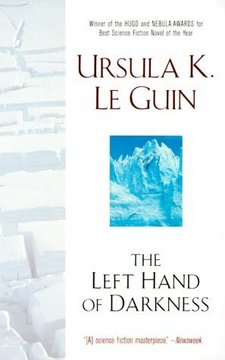Ursula K. Le Guin - The Left Hand of Darkness
 Title The Left Hand of Darkness
Title The Left Hand of Darkness
Released 1969 (originally), re-released in 2000
Publisher Ace Books
ISBN 0441007317
"I’ll make my report as if I told a story, for I was taught as a child on my homeworld that Truth is a matter of the imagination. The soundest fact may fail or prevail in the style of its telling: like that singular organic jewel of our seas, which grows brighter as one woman wears it and, worn by another, dulls and goes to dust."
This is how Le Guin begins her story of Genly Ai, the Envoy of Earth. Genly has been stationed on a distant planet in the heart of an Ice Age. The first of Genly’s kind to visit this planet called it Winter, and the name has stuck, despite the native name of Gethen. The story centers around Genly’s quest to have Winter join the Ekumen, a society of worlds, and the plot details how he attempts to achieve this goal.
But what is the novel really about?
Well, it’s hard to put into words. As Le Guin herself said in the introduction, “If I could have said it non-metaphorically, I would not have written all these words, this novel.†It’s not a long novel (320 pages in trade paperback) and it had somewhat humble beginnings. The book was originally published as an Ace SF Special. Works published under this book line were thought to be somewhat pulpy and – shall we say – less than watersheds in English literature. Nonetheless, Le Guin’s novel rose above that status and went on to become a widely read, greatly appreciated novel of significant social commentary. It won the Hugo and the Nebula Award (one of only a handful of books to win both).
Perhaps the most interesting aspect of the book is Le Guin’s dealings with the issue of sex and gender. The native people of Winter have no specific gender, and instead take on the role of male or female during coitus. Indeed, sex itself is a rare thing; the people of Winter are in kemmer (a period when they are biologically and mentally prepared for sex) only occasionally and even then for a short period. There are no men and women, and thus there is no sociological push for men to be masculine or for women to be feminine. Le Guin explores through the story what would happen if the societal roles of sexuality were to be removed. In fact, Le Guin turns the concept of sexual deviancy and societal standards on its head. Instead of these people being seen as disgusting, Genly is often referred to as a “pervert.†Because these people are in the majority, they view Genly as a pariah.
This is a fine novel with many virtues, but its focus is different than some people may be expecting. There is scant characterization of the main character. We know little of Genly at the beginning of the novel, and we still know little of him at the end. Le Guin has wisely chosen instead to focus on Genly’s travel companion and friend, Estraven. Estraven, being a native of Winter, is the true alien to the reader. Genly is from Earth, and therefore accepted as a "normal" human being; but it is instead the relationship between Genly and Estraven that must be explored.
Which is not to say that this novel is boring by any means. The plot centers around Genly’s arrival to Winter, his banishment, imprisonment, and escape. The final third of the novel deals with Genly and Estraven travelling across The Ice in the dead of winter. But this is not the focus of the novel – not the real focus. When you strip away the trappings of fiction, you'll find that the novel's true focus is to comment on the world around us. The story is not about Winter, it is about Earth, and it is about how we deal with our own sexuality and humanity. The story is about Truth, told through imagination.
![]()
About this entry
- By Austin Ross
- Posted on Friday, August 18 2006 @ 9:37 pm
- Categorised in Books, Review
- Tagged with the left hand of darkness, ursula k. le guin
- 3 comments

Thanks, that was interesting. I've had this book on my shelf for a while but haven't read past the first chapter. I may one day get around to revisiting it.
Have you read the Earthsea books, Austin?
By Phil_A
August 21, 2006 @ 5:18 pm
reply / #
It's a great book, but I must admit it took me some time to really get into it. It's well worth the time, though.
And no, I'm afraid I haven't read any of the Earthsea books yet. I keep meaning to, though.
By Austin Ross
August 21, 2006 @ 9:26 pm
reply / #
I love your analysis on this book! I actually had some of the same ideas in a 10-page research paper I wrote on this novel.
Le Guin is an excellent writer!
By Molly
February 07, 2008 @ 7:26 am
reply / #